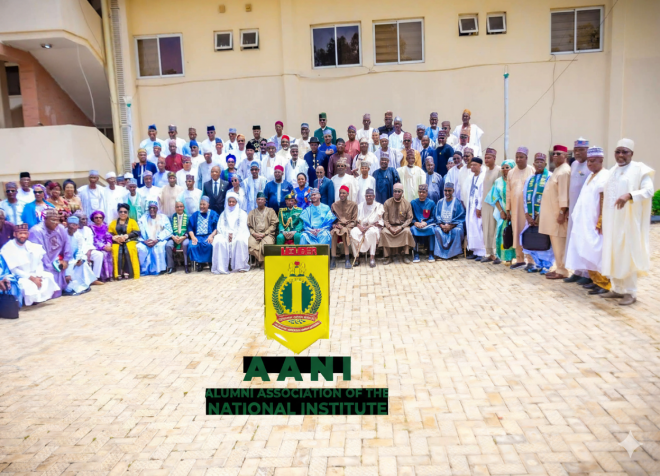History of AANI
The Alumni Association of the National Institute (AANI)
The Alumni Association of the National Institute (AANI) was born out of the shared experience and vision of participants of the National Institute for Policy and Strategic Studies (NIPSS), Kuru. It serves as a platform that connects graduates of the Institute, allowing them to continue contributing to national development through dialogue, collaboration, and policy engagement.
The Beginning
Former President Olusegun Obasanjo, who established NIPSS, once described AANI as “an unplanned outcome of a purposeful action.” The Association was first inaugurated in March 1980 by the pioneer Director-General of NIPSS, Major-General T.B. Ogundeko, during the graduation ceremony of the first Senior Executive Course in Jos. A second, more formal inauguration took place on 28 February 1981 at Kuru, chaired by Alhaji Ahmed Talib, a founding member of the Institute’s Board of Governors.
The goal of the Association has always been to maintain a lasting connection between the Institute and its former participants while promoting continued engagement with the ideas and objectives of NIPSS.
Growth and Traditions
Since its formal establishment, AANI has held its Annual General Meeting (AGM) at the Institute’s headquarters in Kuru every first Saturday of March. The only exceptions were in 2011 and 2019, when the meetings took place in Abuja. The AGM serves as a homecoming for members, providing an opportunity to reconnect, share experiences, and discuss issues affecting the nation, the Institute, and the Association itself. It also allows new participants of the Senior Executive Course to interact with alumni who have gone through similar training.
Recognition and Representation
AANI gained formal recognition in October 1983 when President Shehu Shagari approved that the sitting President of AANI would automatically serve as a member of the NIPSS Board of Governors. This decision strengthened the relationship between the Institute and its alumni.
Since then, several AANI Presidents have served on the Board, beginning with Major-General David Jemibewon, who led the Association from 1982 to 1984. Others who followed include Alhaji Mohammed Danmadami, Chief Olabiyi Durojaiye, Air Vice Marshal M. Yahaya, and Lieutenant-General J.T. Useni. After a gap in representation between 2000 and 2007, Prince Julius Adelusi-Adeluyi served on the Board from 2009 to 2015. The Association currently has no representative on the Board, which is chaired in acting capacity by General Gabriel Abayomi Olonisakin, the Chief of Defence Staff.
Continuing the Vision
Over the years, AANI has remained a vital link between NIPSS and the nation’s leadership community. Through its activities, the Association continues to uphold the ideals of national unity, strategic leadership, and public service that NIPSS represents.

AANI Structure and National Contributions
The Association of Alumni of the National Institute (AANI) is administered through the Annual General Meeting, National Executive Committee (NEC), Standing Committees, and Chapter Executive Committees. It initially operated in six zones, later expanded to ten for more effective coordination, and from 2003 evolved into twenty-seven state chapters. Zone Chairpersons sit on the NEC, which is elected every two years and comprises the President, key executive officers, and all Chapter Chairpersons. The Association’s work is supported by sixteen functional committees along with two advisory bodies: a seven-member Board of Patrons and a seven-member Heritage Council. AANI members have been central to Nigeria’s governance and development. During the military era (1978–1999), alumni included a Military President (General Ibrahim Babangida), two Heads of State (Generals Sani Abacha and Abdulsalami Abubakar), four military-era Prime Ministers, ministers, heads of government agencies, state Secretaries to Government, judges, diplomats, and leaders in major public institutions. They likewise contributed significantly to the private sector through senior executive and entrepreneurial roles. Since 1999, AANI continues to provide high-level human resources across public service, politics, academia, business, and professional sectors nationwide, strengthening national leadership and development each year.

